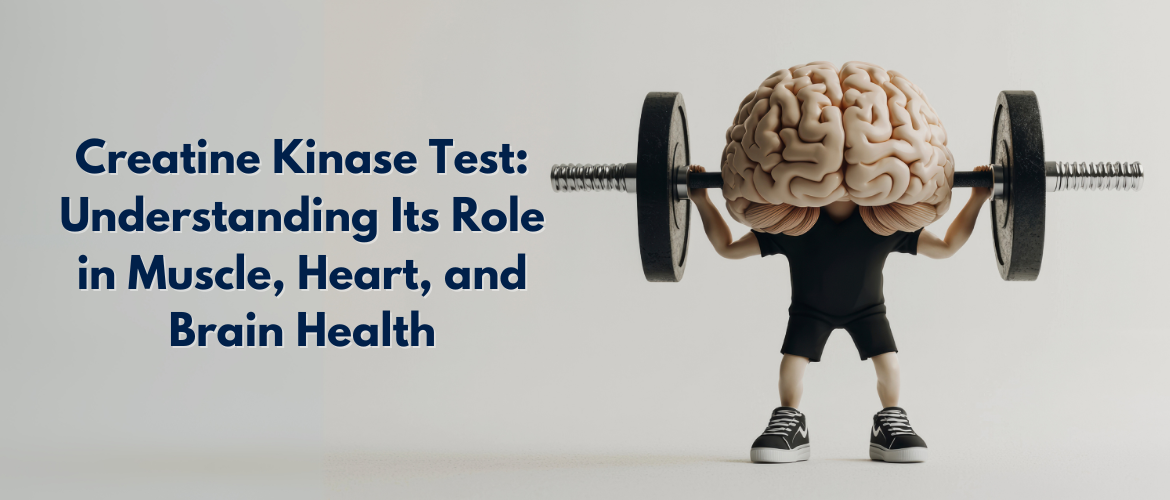No products in the cart.
Creatine Kinase Test: Understanding Its Role in Muscle, Heart, and Brain Health

The Creatine Kinase (CK) test, also known as the Creatine Phosphokinase (CPK) test, is a vital diagnostic tool used to measure the levels of creatine kinase in your blood. This enzyme plays a crucial role in energy production and is primarily found in your skeletal muscles, heart, and brain. Elevated CK levels can indicate muscle damage, heart conditions, or even brain injuries, making this test an essential part of modern medical diagnostics.
In this blog, we’ll explore what the Creatine Kinase test is, why it’s performed, and what elevated or low CK levels mean for your health. Whether you’re experiencing muscle pain, recovering from an injury, or managing a chronic condition, understanding this test can provide valuable insights into your overall well-being.
What Is Creatine Kinase?
Creatine Kinase (CK) is an enzyme that helps your body produce energy by converting creatine into phosphocreatine, a high-energy molecule stored in your muscles. This energy is essential for muscle contractions and other high-intensity activities.
There are three main types of CK enzymes:
- CK-MM: Found mostly in skeletal muscles.
- CK-MB: Found in heart muscle.
- CK-BB: Found in brain tissue.
When muscle, heart, or brain tissues are damaged, CK leaks into the bloodstream, leading to elevated levels that can be detected through a blood test.
Why Is a Creatine Kinase Test Performed?
The CK test is used to diagnose and monitor conditions that cause muscle, heart, or brain damage. Here are some common reasons why your doctor might recommend this test:
1. Muscle Injuries and Disorders
- Rhabdomyolysis: A condition where muscle tissue breaks down rapidly, releasing CK and other substances into the blood.
- Muscular Dystrophy: A group of genetic disorders that weaken muscles over time.
- Myositis: Chronic inflammation of the muscles.
2. Heart Conditions
- Heart Attack: Elevated CK-MB levels can indicate damage to the heart muscle.
- Myocarditis: Inflammation of the heart muscle.
3. Brain Injuries
- Stroke: CK-BB levels may rise after a stroke or traumatic brain injury.
4. Monitoring Recovery
- After surgery, accidents, or intense physical activity, a CK test can help monitor recovery and detect complications.
What Do Elevated CK Levels Mean?
High levels of creatine kinase in the blood can indicate:
- Muscle Damage: Caused by intense exercise, injuries, or conditions like rhabdomyolysis.
- Heart Damage: Elevated CK-MB levels may signal a heart attack or other cardiac issues.
- Brain Damage: Increased CK-BB levels can result from strokes or brain injuries.
Other factors that may contribute to elevated CK levels include:
- Certain medications (e.g., statins).
- Infections or autoimmune diseases.
- Prolonged immobilization or extreme physical exertion.
What Do Low CK Levels Mean?
While less common, low CK levels can occur due to:
- Reduced muscle mass (e.g., in older adults).
- Chronic illnesses that affect muscle health.
- Certain genetic conditions.
How Is the Creatine Kinase Test Performed?
The CK test is a simple blood test that involves drawing a small sample from a vein in your arm. The procedure is quick and typically causes minimal discomfort.
Preparation Tips:
- Inform your doctor about any medications or supplements you’re taking, as these can affect CK levels.
- Avoid intense physical activity 24-48 hours before the test to prevent artificially elevated results.
How to Interpret CK Test Results
Normal CK Levels:
- Men: 38-174 units per liter (U/L).
- Women: 26-140 U/L.
- Children: 150-499 U/L (varies by age).
Elevated CK Levels:
- May indicate muscle, heart, or brain damage. Further tests are often required to pinpoint the exact cause.
Low CK Levels:
- Rare but may suggest reduced muscle mass or chronic conditions.
Always consult your healthcare provider for a detailed interpretation of your results.
How to Maintain Healthy CK Levels
- Stay Active: Regular exercise helps maintain muscle health but avoid overexertion.
- Balanced Diet: Include protein-rich foods to support muscle repair and recovery.
- Hydration: Proper hydration prevents muscle cramps and reduces the risk of rhabdomyolysis.
- Medication Awareness: Discuss potential side effects of medications like statins with your doctor.
Final Thoughts
The Creatine Kinase test is a valuable diagnostic tool that provides insights into your muscle, heart, and brain health. Whether you’re recovering from an injury, managing a chronic condition, or simply monitoring your well-being, understanding your CK levels can help you take proactive steps toward better health.
If you’re experiencing symptoms like muscle pain, weakness, or chest discomfort, consult your healthcare provider about whether a CK test is right for you. Early detection and intervention can make all the difference in managing your health effectively.
Start your wellness journey today — Visit Unike Nutra Now
Follow us
Facebook – https://www.facebook.com/profile.php?id=61567462823245
Instagram – https://www.instagram.com/unikenutra/
Twitter – https://x.com/Unikenutra
LinkedIn: https://www.linkedin.com/company/unike-nutra/
Amazon: https://www.amazon.com/stores/UnikeNutra/
Buy Now:






